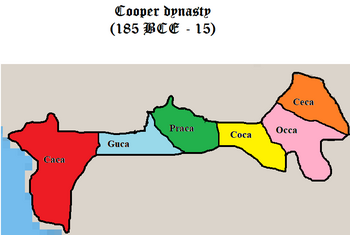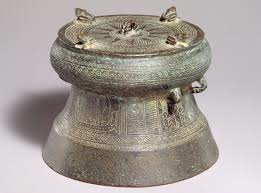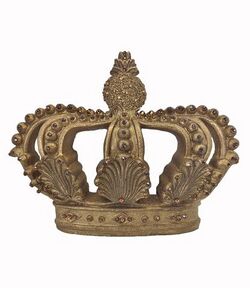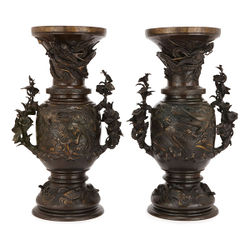Cooper dynasty
Yebi Confederation Yebi | |||||||||
|---|---|---|---|---|---|---|---|---|---|
| 185 BCE–15 | |||||||||
 The map of Yebi in the Cooper dynasty in 100 BCE (Click image to view full size) | |||||||||
| Status | Tribe | ||||||||
| Capital | Ceca | ||||||||
| Common languages | Old Vihish | ||||||||
| Religion | Buddhism | ||||||||
| Government | Tribe | ||||||||
| King | |||||||||
• 185-178 BCE | Luca Cooper (first) | ||||||||
• 0-15 | Nathan Cooper (last) | ||||||||
| Historical era | Antiquity | ||||||||
• Dynasty established | 185 BCE | ||||||||
| 74 BCE | |||||||||
• Subverted by Caleb Cunningham | 15 | ||||||||
| Currency | None(Co Hunting and Gathering culture) | ||||||||
| |||||||||
| Today part of | |||||||||
Chronology
These are the emperors of the Cooper dynasty and when did they reigned:
1.Luca Cooper (185-178 BCE)
2.Aiden Cooper (178-154 BCE)
3.Freddie Cooper (154-108 BCE)
4.Morgan Cooper (108-85 BCE)
5.Liam Cooper (85-42 BCE)
6.Harold Cooper (42-24 BCE)
7.Stanley Cooper (24 BCE - 0)
8.Nathan Cooper (0-15).
Origin of name
Yebi is named after the named of the four officers in the Jakob Abraham's reign that helped Luca Cooper to uprose and end the awful reign of Jakob Abraham to made the Cooper dynasty. Four officers are : York Smith,Ealdun Jones,Baird Taylor and Ian Brown.
History
Predynastic stage
The first king of the Cooper dynasty, Luca Cooper was an officer in the Jakob Abraham reign. They knew that Jakob Abraham wasn't a good king for the country, he decided to took the trusts from the officers in the Jakob Abraham reign. Almost of them support Luca Cooper. There are four people in the tribe that were completely trusted Luca Cooper, they are York Smith, Ealdun Jones, Baird Taylor and Ian Brown.
The first Cooper king
The first king of the Cooper dynasty, Luca Cooper became stronger and stronger with four allies, they soon uprose and fought Jakob Abraham. Without worried, Jakob Abraham stilled sleep. Of course, Luca Cooper won and killed Jakob Abraham. This event marked the end of Abraham dynasty and the beginning of the Cooper dynasty.
Early Cooper
Like Vincent Abraham, Luca Cooper's just reigned for 7 years and the resigned. His son, Aiden Cooper begun to resigned and the Early Cooper phase continued with the reigns of Freddie Cooper and Morgan Cooper.
Eran-Vihan Clans invasions
The Eran-Vihan clans were Neranian Erans that mingled with some Vihish people. They ruled a small area east of the dynasty, and attempted raids on several cities, but most were unsuccessful. For further informations about the invasions, see this page : http://iiwiki.com/wiki/List_of_major_Eran-Vihan_invasions
Late Cooper
After the war, the country continued to grow until the death Liam Cooper in 42 BCE. There's a steep decline from reign of Harold Cooper and Stanley Cooper, then in the reign of Nathan Cooper, the nation received a dramatic decline. An officer in the Cooper dynasty, decided to dethrone the reign of Nathan Cooper and become the king of the nation.
Government and economy
Organization
The king was the commander of the tribe. The person who ruled the millitary was called YIMC. The person who made the regulations and laws in the Cooper dynasty is called YILC. The person who ruled the economy was called YIEC. Also, there was two new officers that Luca Cooper made, the first one was the YITC, the one who ruled the transportation in Yebi. And the second one was the YIAC, the one who ruled the Argiculture.
Argiculture
Technically, all farmland was in possession of the Emperor. Each village allocated the farmland to households. Each household farmed their allocated land and paid annual tax, as well as provided mandatory labors and military services. To facilitate cultivation, the central court built irrigation facilities and river levees. Buffalo and ox slaughtering was strictly prohibited since these cattle provided indispensable draft force in farming.
Culture
Art
The art industry in the Cooper dynasty was more developed than the Abraham dynasty. The Emperor developed the art industry by opening many art classes, to taught people in the country about how to make art crafts. The most valuable crafts that still remained were the bronze drums. People in the Abraham dynasty have just founded it, and in the Cooper dynasty, people made it and sold it to some neighbour countries of Yebi.
This is a picture of a bronze drum in the Cooper dynasty:
Pottery
The pottery industry in the Cooper dynasty was less developed than in the Abraham dynasty because of the development of the art industry.
Demographics
Ethnic
In the Cooper dynasty, Yebi just had 1 ethnic. It was Yevi. Liam Cooper unified two of the biggest ehtnics that time, Savi and Vivi to Yevi. The unification was because to fight against the Eran-Vihan Clans.
Religion
In the Cooper dynasty, there were two new religions. They were Taoism and Christianity. Taoism was first introduced to Yebi by a man named Ealdun Jones in Caca. Christianity was first introduced to Yebi by a man named Ian Brown in Guca. Otherwise, the Buddhism in Yebi continued to growed. Taoism and Christianity weren't an official religion in the Yebi. They were an official religion in the Cunningham dynasty. Both Ealdun Jones and Ian Brown helped Luca Cooper to established from the Abraham dynasty.
Technology
Bronze tools
The technology of making bronze tools has improved in the Cooper dynasty. Almost everything in the house of a people in the Cooper dynasty was made of bronze. Bronze chairs, bronze tables, bronze weapons, bronze drums, bronze crown (of the king), etc were some of many bronze tools in the Cooper dynasty.
This is a picture of the Emperor Morgan Cooper's bronze crown :
Iron tools
Along with the growth of making bronze tools, people in the Cooper dynasty also made iron tools. Iron tools were not as popular as bronze tools but we can some of it in the wealthies family. Iron weapons, iron chairs, iron tables, iron hats, iron vases, etc were some of many iron tools in the Cooper dynasty.
This is a picture of two iron vases in the Cooper dynasty:
Archaeological remains
Due to the limit of written records, verifiable historical information on the history of the Cooper dynasty largely comes from archaeological evidence – vestiges such as the Cooper kings' Temple in Walvus.
